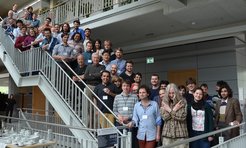Mathematical tools to understand the brain: fluctuating correlated dynamics across scales in networks of neurons
Leading experts in theoretical neuroscience meet at The Bernstein Centre for Computational Neuroscience from May 24 to May 27, 2016

The theory of recurrent networks has a long history in physics and its ramifications are highly relevant for our understanding of dynamics and learning in neuronal networks. Despite impressive progress in computational neuroscience, we are still far from a canonical theory of biologically realistic recurrent networks. Bridging from the microscopic single cell dynamics to observable macroscopic population phenomena remains a challenge. A consistent theory of the fluctuating and correlated dynamics on multiple spatio-temporal scales, which is ubiquitously reported experimentally, is still lacking.

This workshop is organized by an international team of junior scientists: Dr. Guillaume Lajoie (Univ. of Washington, USA & MPI-DS / BCCN Göttingen), Dr. Farzad Farkhooi (Technische Universität Berlin & BCCN Berlin), Dr. Moritz Helias (Forschungszentrum Jülich & RWTH Aachen University) and Dr. Merav Stern (Technion, Israel).
The meeting aims to bring together key researchers to survey and discuss recent advances of recurrent network theory of fluctuating and correlated dynamics on multiple temporal and spatial scales to pinpoint limitations of the existing theoretical tools and methods. The organizers seek active discussions among participants and speakers, the exchange of new approaches and methods, and presentations that will spark new ideas for future developments. The meeting aims to serve as a forum for key researchers working with mean-field approaches and/or their emerging alternatives to exchange their tools and views. These exchanges will be complemented by tutorial sessions and poster presentations aimed at students and junior researchers.

